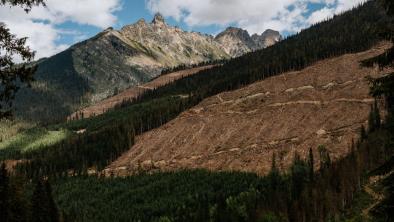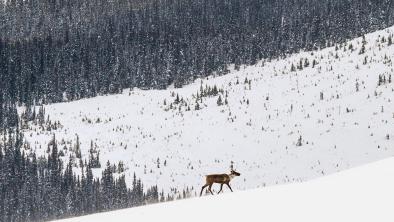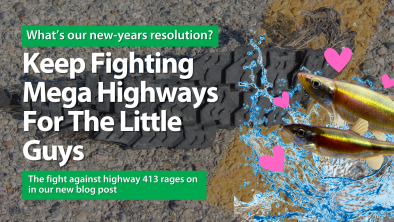Haida Nation says no way to oil tanker traffic
Wednesday, September 02, 2009
Queen Charlotte Islands Observer

Plans by a Calgary company to pipe crude oil to Kitimat, allowing it to be shipped through north coast waters, are "ludicrous" and "unbelievable", and will never be allowed to happen, says Haida Nation president Guujaaw.
Speaking to two top executives from Enbridge Inc. at a public gathering in Skidegate Friday (Aug. 28), Guujaaw said the project would put the entire Haida way of life at risk for nothing more than the chance for investors and company officials to make money.
Guujaaw said islanders learned first-hand from Prince William Sound people who visited Haida Gwaii earlier this year what happens when an oil spill contaminates the ocean and coastline.
"Those people lost their traditional ways, lost their access to food," he said, following the crash of the Exxon Valdez oil tanker in 1989, the effects of which are still being felt.
Guujaaw said no one should believe company promises that an oil spill would be immediately contained and that compensation would be paid for any environmental damage.
The Alaskan people are still waiting for compensation, he said. And it would be impossible to move fast enough to contain a spill in the isolated and storm-prone north coast waters.
Guujaaw said the two executives who traveled to Skidegate to hear from the Haida, Enbridge president Pat Daniel and Enbridge Northern Gateway Pipelines president John Carruthers, seem like nice guys, but they are also "monsters" whose goal is to get the pipeline built and make money, no matter how that could affect the future of the Haida Nation.
"It is unbelievable what these people will calmly get up here and propose to us," he told the audience of elders, chiefs and other islanders. "They themselves would risk nothing in doing this, they have nothing to lose."
Guujaaw called the Alberta tar sands, where the oil would be coming from, "one of the biggest unnatural disasters going on in the world right now," and said it's "crazy. a goofy idea" to ship oil from Alberta to southeast Asia at the same time that Canada is importing oil.
He ended by telling Mr. Carruthers and Mr. Daniel that the Haida Nation will not put its land and waters at risk for this project or anything else.
"I'm not going to say we'll be affected, because there is no damn way this is going to happen," he said.
Mr. Daniel, who according to the Financial Post took home compensation of $6.5-million last year, and Mr. Carruthers started the gathering with a brief explanation of the pipeline project. They said they had come to Haida Gwaii because of the Living Oceans Society, which had urged them to listen to the people who would be directly affected by north coast tanker traffic.
Mr. Daniel said Enbridge is in the oil delivery business. The company operates crude oil pipelines and natural gas pipelines, including the longest oil pipeline in the world. The reason Enbridge wants to build a pipeline from Edmonton to Kitimat is that it would allow Alberta oil producers to sell to a whole new market in Southeast Asia, rather than being limited to the United States.
Mr. Carruthers said the project would see 14 tanks built beside Kitimat's deep harbour to store crude oil. Tankers would load the oil then take it to the Southeast Asia or anywhere else the producers could sell it.
"We envision 225 tankers coming in each year," he said. These vessels would be various sizes, ranging from cruise ship size to supertanker.
The project must undergo two public regulatory processes before it goes ahead, one through the National Energy Board, and one through the Canadian Environmental Assessment Agency.
"We will make sure this is as safe a project as you can get," Mr. Carruthers said. "We need to make sure the project is safe and that people benefit."
But elder after elder told the two men that there is no way anyone could guarantee that hundreds of tankers loaded with crude oil would never have an accident, and that just one spill could end all traditional food gathering on Haida Gwaii.
"What we're talking about today doesn't feel good inside," said Diane Brown. "To lose our food source is not an option, you can't pay us anything to get that back. As a grandmother and a woman of the nation, I can promise you that I will do everything in my power not to see this go through."
Reynold Russ, Chief Iljuwaas, said he heard many people speak against the pipeline project when he was at the elders gathering in Terrace this summer. The people from Prince William Sound were also promised that there would be no oil spills, he said.
"It was supposed to be accident-free and yet how many tons of crude oil was dumped?" he said, adding that the Enbridge officials should have visited the islands to hear the opposition before they ever proposed this project.
"Haida Gwaii is our island, our land, we own it, lock stock and barrel," Chief Iljuwaas said. "We don't want money."
Speaking to two top executives from Enbridge Inc. at a public gathering in Skidegate Friday (Aug. 28), Guujaaw said the project would put the entire Haida way of life at risk for nothing more than the chance for investors and company officials to make money.
Guujaaw said islanders learned first-hand from Prince William Sound people who visited Haida Gwaii earlier this year what happens when an oil spill contaminates the ocean and coastline.
"Those people lost their traditional ways, lost their access to food," he said, following the crash of the Exxon Valdez oil tanker in 1989, the effects of which are still being felt.
Guujaaw said no one should believe company promises that an oil spill would be immediately contained and that compensation would be paid for any environmental damage.
The Alaskan people are still waiting for compensation, he said. And it would be impossible to move fast enough to contain a spill in the isolated and storm-prone north coast waters.
Guujaaw said the two executives who traveled to Skidegate to hear from the Haida, Enbridge president Pat Daniel and Enbridge Northern Gateway Pipelines president John Carruthers, seem like nice guys, but they are also "monsters" whose goal is to get the pipeline built and make money, no matter how that could affect the future of the Haida Nation.
"It is unbelievable what these people will calmly get up here and propose to us," he told the audience of elders, chiefs and other islanders. "They themselves would risk nothing in doing this, they have nothing to lose."
Guujaaw called the Alberta tar sands, where the oil would be coming from, "one of the biggest unnatural disasters going on in the world right now," and said it's "crazy. a goofy idea" to ship oil from Alberta to southeast Asia at the same time that Canada is importing oil.
He ended by telling Mr. Carruthers and Mr. Daniel that the Haida Nation will not put its land and waters at risk for this project or anything else.
"I'm not going to say we'll be affected, because there is no damn way this is going to happen," he said.
Mr. Daniel, who according to the Financial Post took home compensation of $6.5-million last year, and Mr. Carruthers started the gathering with a brief explanation of the pipeline project. They said they had come to Haida Gwaii because of the Living Oceans Society, which had urged them to listen to the people who would be directly affected by north coast tanker traffic.
Mr. Daniel said Enbridge is in the oil delivery business. The company operates crude oil pipelines and natural gas pipelines, including the longest oil pipeline in the world. The reason Enbridge wants to build a pipeline from Edmonton to Kitimat is that it would allow Alberta oil producers to sell to a whole new market in Southeast Asia, rather than being limited to the United States.
Mr. Carruthers said the project would see 14 tanks built beside Kitimat's deep harbour to store crude oil. Tankers would load the oil then take it to the Southeast Asia or anywhere else the producers could sell it.
"We envision 225 tankers coming in each year," he said. These vessels would be various sizes, ranging from cruise ship size to supertanker.
The project must undergo two public regulatory processes before it goes ahead, one through the National Energy Board, and one through the Canadian Environmental Assessment Agency.
"We will make sure this is as safe a project as you can get," Mr. Carruthers said. "We need to make sure the project is safe and that people benefit."
But elder after elder told the two men that there is no way anyone could guarantee that hundreds of tankers loaded with crude oil would never have an accident, and that just one spill could end all traditional food gathering on Haida Gwaii.
"What we're talking about today doesn't feel good inside," said Diane Brown. "To lose our food source is not an option, you can't pay us anything to get that back. As a grandmother and a woman of the nation, I can promise you that I will do everything in my power not to see this go through."
Reynold Russ, Chief Iljuwaas, said he heard many people speak against the pipeline project when he was at the elders gathering in Terrace this summer. The people from Prince William Sound were also promised that there would be no oil spills, he said.
"It was supposed to be accident-free and yet how many tons of crude oil was dumped?" he said, adding that the Enbridge officials should have visited the islands to hear the opposition before they ever proposed this project.
"Haida Gwaii is our island, our land, we own it, lock stock and barrel," Chief Iljuwaas said. "We don't want money."


